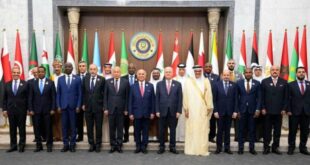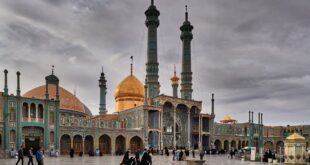WASHINGTON (Agencies) — President George W. Bush held his first White House meeting with a Palestinian leader in four years Thursday and reaffirmed the US commitment to a viable Palestinian state and an end to Israeli settlement expansion.
Bush made his remarks after conferring with Palestinian President Mahmoud Abbas, who made a ground-breaking visit to Washington warning the peace process could collapse without more US backing for his fledgling government.
The US leader, who shunned Abbas’ predecessor Yasser Arafat, went out of his way to proclaim support for the new Palestinian leadership, including a direct grant of $50 million for housing and infrastructure assistance in Gaza.
Israel’s planned withdrawal from Gaza in August opened an opportunity to return to an internationally drafted “roadmap” aimed at the coexistence of two independent states, Bush told a joint news conference.
“I believe that the Palestinian people are fully capable of justly governing themselves in peace with their neighbours,” Bush said. He told Abbas: “We will work with you to help realise the dream of a free and democratic Palestine.”
Bush also ran down a list of obligations for Israel, including efforts to improve the lives of Palestinians in occupied territories and avoidance of any moves that would compromise future talks.
“Israel should not undertake any activity that contravenes roadmap obligations or prejudices final status negotiations with regard to Gaza, the West Bank and Jerusalem,” Bush said.
He said Israel “must remove unauthorised outposts and stop settlement expansion” and the controversial barrier being erected by Israel to stem attacks “must be a security rather than political barrier.”
“A viable two-state solution must ensure continuity of the West Bank, and a state of scattered territories will not work,” Bush said. “There must also be meaningful linkages between the West Bank and Gaza.
He also said that as the “roadmap” process progress, Israeli forces should withdraw to positions held on September 28, 2000 at the start of the latest outbreak of violence that has now claimed 4,760 lives.
The $50 million in direct aid was a significant gesture to Abbas given the Palestinians’ complaints the Americans were channelling most help through third parties for fear it would be siphoned off by corrupt officials.
Perhaps most significant was the sight of Abbas standing in the White House compound as Palestinian president where Israeli Prime Minister Ariel Sharon has been a frequent visitor.
Abbas, making the first White House visit by a Palestinian leader since Arafat came here in January 2001, went into the talks speaking of his worry over the progress of the peace process.
He said the Palestinians were willing to coordinate with Israel on the Gaza withdrawal, but it was only a first step and should not be at the expense of the West Bank.
“We must then immediately move towards permanent status negotiations, dealing with issues at the core of the conflict,” Abbas said, citing the fate of East Jerusalem, security, refugees, borders, water and settlements.
He expressed “deep concern” over continued Israel settlement activities and construction of the security barrier, saying they had fuelled feelings of “frustration, despair and loss of hope” among the Palestinians.
Abbas went to the White House after conferring with administration and congressional leaders and expressing suspicion that the Israelis were backing away from the notion of a Palestinian state.
“Every day Israel is undertaking steps that undermine President Bush’s vision and effectively preclude a two-state solution to the Israeli-Palestinian conflict,” Abbas wrote in Thursday’s Wall Street Journal.
He signalled that efforts at Palestinian reforms were also at risk. “If the two-state solution dies, our democracy cannot be far behind, for democracy and freedom are intertwined: it is impossible to have one without the other.”
Bush called Abbas’ election in January “a tribute to the power and appeal of democracy” but pointedly reminded him of his duty to crack down on violence and corruption, reform his security services and boost the Palestinian economy.
“You have made a new start on a difficult journey, requiring courage and leadership each day,” Bush told him. “And we will take that journey together.”
He also called on Arab states to back the Middle East peace process with financial aid and, in an allusion to American complaints about Syria, a refusal to help groups seeking to torpedo the talks.
“Arab states must take concrete measures to create a regional environment conducive to peace,” he said. “They must offer financial assistance to all. … And they must refuse to assist or harbour terrorists.”
 Eurasia Press & News
Eurasia Press & News



